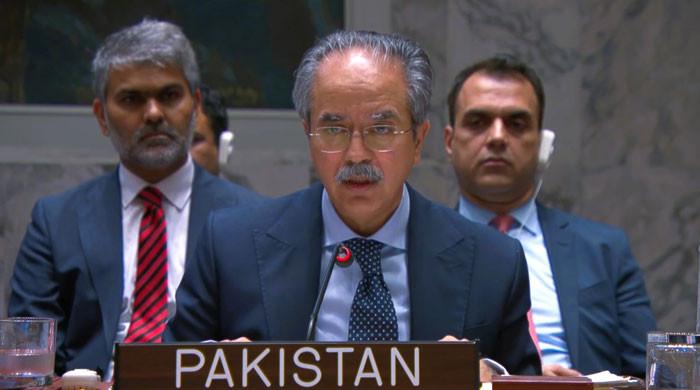Pakistan Warns of ‘Grave Danger’ from Israeli Strikes at UN
Pakistan addressed the Security Council during an emergency session on Friday, stating that Israeli strikes on Iranian nuclear and military sites pose a “grave danger and a serious threat” to regional and international peace, security, and stability.
The 15-member Council adjusted its schedule to address the escalating crisis, also hearing from the UN nuclear watchdog head, who cautioned about significant risks to regional stability and nuclear safety.
Ambassador Asim Iftikhar Ahmad, Pakistan’s Permanent Representative to the UN, firmly denounced Israel’s “unjustified and illegitimate” aggression against Iran during the UN meeting.
He restated Islamabad’s unwavering support for the Iranian government and its citizens.
Iran’s Foreign Minister, Abbas Araghchi, had requested the Security Council meeting, asserting that Israel “has now crossed every boundary, and the international community must not allow these actions to go unaddressed.”
Pakistan, alongside China and Russia, backed the call for the emergency session.
Amid rising tensions, the Pakistani envoy urged the Council to uphold international law and immediately cease the aggression.
Ambassador Asim strongly advocated for settling the crisis through discourse and diplomacy.
Rosemary DiCarlo, the UN Under-Secretary-General for Political Affairs, informed the Security Council that the repercussions of the attacks were already apparent.
She said, “I reiterate the Secretary-General’s condemnation of any military escalation in the Middle East,” while urging both Israel and Iran to show maximum restraint and “avoid at all costs a descent into a deeper and wider regional conflict.”
She mentioned that the escalation occurred as “some significant diplomatic developments” were in progress, including the scheduled resumption of US-Iranian discussions in Oman over the weekend. However, recent reports suggest Iran will no longer participate.
DiCarlo encouraged all parties to remain dedicated to diplomacy.
“A peaceful resolution through negotiations remains the optimal method to assure the peaceful nature of Iran’s nuclear programme,” she stated. “We must, at all costs, avert a growing conflict that could have extensive global repercussions.”
Rafael Grossi, Director General of the International Atomic Energy Agency (IAEA), also addressed the Council, stating the agency was in continuous contact with the Iranian Nuclear Regulatory Authority to evaluate the status of impacted facilities and ascertain broader effects on nuclear safety and security.
He emphasized that nuclear sites should never be targeted, regardless of the circumstances.
“Such attacks carry serious implications for nuclear security, nuclear safety and safeguards, as well as regional and international peace and security,” Grossi commented.
He added his readiness to visit the region promptly to assess the situation and support efforts on safety, security and non-proliferation in Iran.
“Clearly, the only sustainable way forward for Iran, Israel, the entire region and the international community lies in dialogue and diplomacy to ensure peace, stability and cooperation.”
Grossi concluded by offering the IAEA as an unbiased platform where “facts prevail over rhetoric” and where technical engagement supersedes escalation.
“I reaffirm my personal commitment, and that of the agency, to facilitate dialogue and support efforts that promote transparency, security, and the peaceful resolution of nuclear issues in Iran,” he concluded.



Comments (0)
No comments yet. Be the first to comment!
Leave a Comment